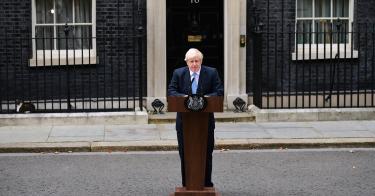Boris Johnson’s premiership will understandably focus on dealing with Brexit. However another problem that refuses to go away will need to dealt with: extremism, the challenge of which is growing ever more complex. So here are six things that Prime Minister Johnson – in conjunction with Home Secretary Priti Patel – should prioritise as a part of a coherent counter-extremism agenda for his government.
Improve Prevent
Prevent – the wide-ranging community safeguarding programme – remains a vital component of the UK’s counter-terrorism apparatus, one of those government initiatives sometimes more admired abroad than it is at home. Despite this, in January 2019 an independent review into Prevent was announced by then-Security Minister Ben Wallace. Prevent could doubtless be more effective. Yet that is not the aim of the ‘Preventing Prevent’ lobby, a motley crew of student unions, left-wing academics and politicians, and human-rights and lobby groups like Cage (whose International Director was convicted of a terrorism offence and which described ISIS executioner as ‘a beautiful young man’). Many within this movement cannot be appeased on Prevent: they regard it as unsalvageable.
Thankfully, the appointment of Liberal Democrat peer Lord Carlile – who carried out the first review, back in 2010 – ensures that a sober-minded analysis of Prevent, undertaken in the correct spirit, will take place. The government should be open to the suggestions he comes up with.
Implement a new Counter-Extremism Strategy
The principles behind the 2015 Counter-Extremism strategy were largely sound. It attempted to counter those attitudes within which extremist ideology can take root: homophobia, sectarianism, antisemitism and the like.
However, there were issues with implementation. The fact that the Counter-Extremism strategy shares certain language with Prevent helped create uncertainty as to where one strategy ended and the other began. Furthermore, tension and competitiveness sometimes existed at a local level between Prevent and Counter-Extremism coordinators jockeying for influence.
In a July 2019 speech, Sajid Javid announced that a new Counter-Extremism strategy was going to be drafted. This new strategy should build upon, not eviscerate, the 2015 approach. It should make clearer the differences between Prevent and Counter-Extremism while acknowledging a need for the government to step up efforts in certain areas it has either been reticent to wade into or made little headway on (sectarian disputes, for example, or attitudes towards homophobia).
Revisit the integration agenda
David Cameron was onto something when, in the summer of 2015 he tasked Dame Louise Casey with carrying out a review into social cohesion. Casey discovered increasingly segregated communities and an unwillingness to challenge the behaviour that led to them; public institutions had “ignored or even condoned regressive, divisive and harmful cultural and religious practices, for fear of being branded racist or Islamophobic”.
Yet by the time the review was published in December 2016, Cameron had quit, Brexit had become all-consuming and – happily for a civil service wary of it – the Casey review died on the vine. That was a shame: community cohesion has not exponentially improved in the following years. Casey’s work is worth revisiting.
Push back on ‘Islamophobia’
On the back of a question he received from an anti-semitic Bristol imam at a televised debate for the BBC, Sajid Javid unhelpfully tried to force all his fellow Conservative leadership candidates to commit to undertaking an internal review into Islamophobia. The party’s position seems to currently be that it will carry out an internal review of Conservative ‘Islamophobia’ if it is satisfied with how that word is defined.
That is their prerogative, yet they should be wary. The person appointed last month to help the government come up with a definition – Imam Qari Asim – seems to already have his mind made up on exactly what ‘Islamophobia’ is: after all, he has already accused the Prime Minister of it last year on the back of Johnson’s criticism of burkas. Furthermore, the review should take place only if the party truly feels it has a case to answer – not because Baroness Warsi and Wes Streeting have written lots of op-eds about it in The Guardian or The Independent.
Double down on no engagement with extremists
This is an ongoing duel. The Prevent review of 2011 did much of the heavy lifting in defining extremism (not perfectly, although satisfactorily enough) and laying out criteria for government engagement. As a consequence, groups like the Muslim Council of Britain (MCB) were left out in the cold. However, engagement with MCB, Mend and other groups who like to hint at their representativeness of the Muslim communities in the UK is one of those zombie policies that always seems to return. Still, Priti Patel can at least ensure it is not revived on her watch
Monitor the non-Islamist threat
Islamism is not the only extreme ideology that has been able to take root in the UK. There is the far right, which the government has been relatively vocal about and taken action against (for example, banning the neo-Nazi group National Action in December 2016). However, there is also activity on the far left. The presence of Unite Against Fascism on the streets is normally a pretty good indicator that a brawl is imminent; and then there is Extinction Rebellion, an activist group comprised largely of those concerned about climate change but whose leaders – according to a recent Policy Exchange report – “seek a more subversive agenda, one that that is rooted in the political extremism of anarchism, eco-socialism and radical anti-capitalist environmentalism”. These ideologies do not pose the same threat to life that Islamist terrorists do. But they still need monitoring.
There is more to be done beyond this on the counter-extremism agenda – how best to utilize the work of the Commission for Countering Extremism, for example. But addressing these items would be a good start.
This piece originally appeared in the CAPX



